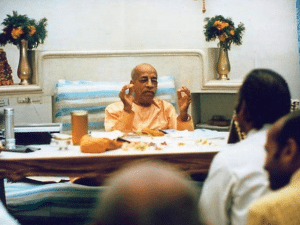Hard collective knot
Visakha Devi Dasi: Once after breakfast, Prabhupada asked all of us to come to his room. We filed in and sat on the thin, sheet-covered mattresses, facing him. I sat in the corner farthest from the door and from Prabhupada, with no idea what to expect.
Prabhupada first noted that Chitralekha was absent and sent Revatinanda Swami to find her. When they were both present, Prabhupada spoke, his voice concerned yet confident. He talked not of the particular difficulties we faced but of basic spiritual knowledge, just as he had in the temple room the day before. At first, his words seemed irrelevant—he wasn't addressing the very real tensions before us. But as I sat and listened, I discovered that his words were quite pointed.
Prabhupada said again that, "We were spiritual beings, eternal souls. Our body, mind, and intelligence cover the soul and were animated by the soul, but unlike the soul, were temporary."
"The soul is eternal,..." Prabhupada said, "...and God—Krishna—is also eternal. And our relationship with him is eternal. That relationship is one of bhakti, devotional service to Krishna."
Prabhupada urged us to focus on our spiritual nature and not on the soul's transient coverings. He encouraged us to engage in spiritual activity—bhakti—by dedicating our mind, words, and body to Krishna’s service without material motivation. Only in that way, he said, would we find lasting happiness.
Prabhupada's words hit me as unsentimental truth. He wasn’t trying to impress us with his knowledge or seniority or even really win us to his point of view. He was telling us what he perceived as the truth. He didn't speak directly to our issues but gave us a framework with which to solve them. And he did it without making us feel guilty or ashamed or foolish.
He appealed to our higher nature—my higher nature, too—a nature he knew beyond a doubt we had. His words were simple, clear, direct, and based on the Bhagavad-gita’s teachings—knowledge that had been passed down from spiritual master to student and made relevant for each generation for millennia. He seemed sure that if we applied it, we'd overcome not only our immediate troubles but lifetimes of trouble. How was it that I found myself starting to take him seriously?
As he spoke, the mood permeating the room slowly shifted and the hard collective knot choking his students relaxed.
